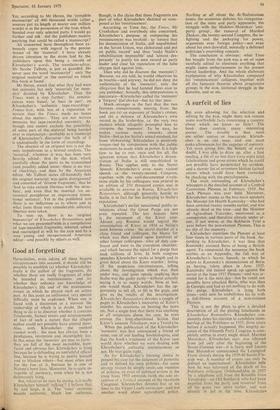Good at forgetting
Nevertheless, even taking all these bizarre circumstances into account, it should still be possible to establish (a) whether Khrushchev really is the author of the fragments, (b) whether these are really fragments of what he intended as reminiscences, and (c) whether they enhance our knowledge of Khrushchev's life and of the momentous events in which he played such an active part. At this point an additional, very special difficulty must be explained. When one is faced with a document or a memoir the authorship of which is in doubt, the first thing to do is to discover whether it contains falsehoods, factual errors and misstatements of fact of such a nature that the alleged author could not possibly have uttered them. Alas, with Khrushchev the method cannot work : the man has always been a prodigious, inveterate and incorrigible liar. In this sense the 'memoirs' are true to form : they are full of the most incredible, bare- faced and obvious lies. Khruslchev is lying because he is defending an untruthful official line, because he is trying to justify himself and to blacken others—but most often just for the fun_ of it, because he is one of Nature's born liars. Moreover, he is quite in- capable of accuracy, even when he is not deliberately lying. But, whatever he may be saying, is it really Khrushchev himself 'talking'? I believe that, by and large, it is. The 'voice' certainly sounds authentic. Much less authentic, though, is the claim that these fragments are part of what Khrushchev dictated or com- posed as his 'reminiscences'.
According to Time Inc, the Times, Mr Crankshaw and everybody else concerned, Khrushchev's purpose in composing his reminiscences' was twofold : to 'ensure that his denunciation of Stalin, still unpublished in the Soviet Union, was elaborated and put on public record' and thus 'make Stalin's rehabilitation impossible' and 'almost des-, perately' to justify his own record as party leader and clear his reputation of the false charges laid against him.
Then why did he disavow the 'memoirs'? Because, we are told, he would otherwise be in trouble—and anyway, he did not deny the authenticity of the 'memoirs', only the allegation that he had handed them over to any publisher. Actually, this interpretation is inaccurate—Khrushchev called the 'memoirs' a 'forgery' (farshivka)—but let that pass.
Much -stranger is the fact that the two features conspicuously missing from the book are (a) an exposure of Stalin's crimes, and (b) a defence of Khrushchev's own record in the leadership, i.e. the very two matters which allegedly prompted him to compose the 'memoirs'. To be sure, he makes various nasty remarks about Stalin—but as for Stalin's actual misdeed, far from 'elaborating' Khrushchev is positively tongue-tied by comparison with the public statements he made while in power. It is high time to lay to rest, once and for all, the ignorant notion that Khrushchev's denun- ciation of Stalin is still unpublished in Russia. This applies only to the Secret Speech; Khrushchev's even more violent speech at the twenty-second Congress, together with the well-documented rwela- tions made by his colleagues, was printed in an edition of 250 thousand copies and is available to anyone in Russia. Khrushchev Remembers, although generally hostile to Stalin, is in fact far less damaging to Stalin's reputation.
Khrushchev's earlier sensational public re- velations about the Great Purge are not even repeated. The key feature here is the treatment of the Kirov case. Almost any Russian would regard the assassination of Kirov in 1934 as Stalin's most heinous crime : the secret murder of a close friend and colleague, the blame for which was then pinned upon hundreds of other former colleagues—who all duly con- fessed and went to the execution chamber, and which became the signal for a purge that took millions of lives. In both congress speeches Khrushchev spoke at length and in great detail about the Kirov murder : listing all the suspicious circumstances, telling about the investigation which was then under way, and quite openly implying that Stalin was the guilty party—without actually saying it in so many words. Now at last; one would think, Khrushchev has the op- portunity to tell all, to fill in the gaps, and give us the results of the investigation. Khrushchev Remembers devotes a couple of pages to Khrushchev's memories of Kirov's murder, his emotions on hearing the news etc. Not a single hint that there was anything at all suspicious about the case; he even revives the long-abandoned fiction that Kirov's assassin Nikolayev, was a Trotskyite.
When the publication of the Khrushchev 'memoirs' was first announced a friend of mine, one of our leading Sovietologists, said that the book's treatment of the Kirov case would show whether we were dealing with Khrushchev's authentic reminiscences or not. He was quite right.
As for Khrushchev's burning desire to present his case for the judgment of posterity and to defend his own policies—for some strange reason he simply omits any mention
of policies, or even of political events in the USSR from 1953 onwards (with the sole ex-
ception of a farcical account of the twentieth Congress). 'Khrushchev devotes five or six lines to the Virgin Lands campaign—and not another word about agricultural policy.
Nothing at all about the de-Stalinisation issues, the economic debates, his reorganisa- tion of the state and party apparatus, the struggle with the Molotov-Malenkov 'anti- party group', the removal of Marshal Zhukov, the twenty-second Congress, the in- fighting and the jockeying for power, arguments over foreign policy—not even about his own downfall, normally a defeated politician's overriding concern: The conclusion is obvious: what Time Inc bought from the KGB was a set of tapes carefully edited to eliminate anything that might cause embarrassment to the present Soviet leadership. And the whole elaborate explanation of why Khrushchev composed , his 'reminiscences' collapses, together with all the fantastic theories about progressive groups in the KGB, factional struggle in the Kremlin, and so on.










































 Previous page
Previous page